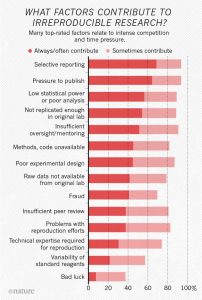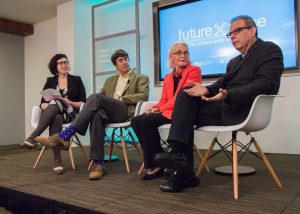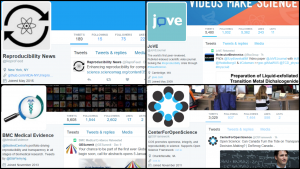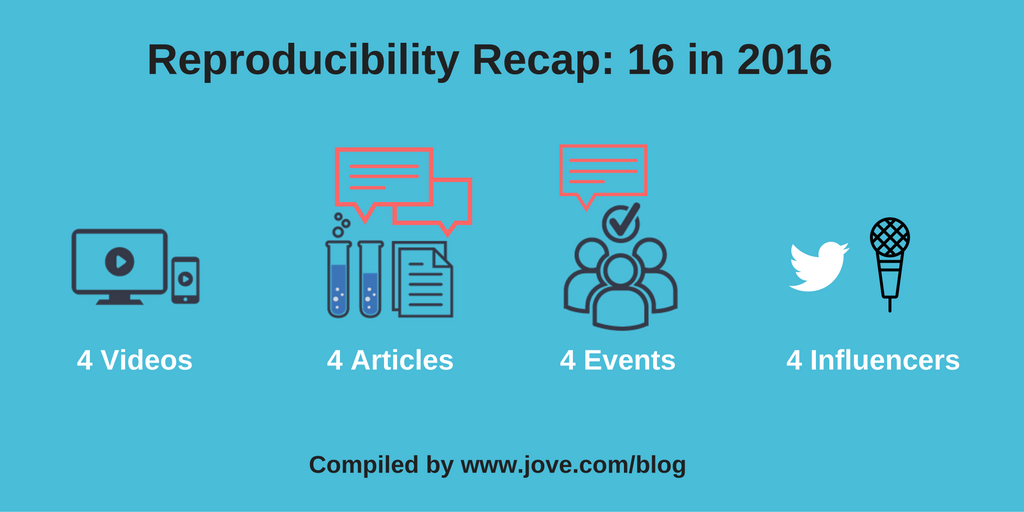2016 saw a tremendous amount of discussion and development on the subject of scientific reproducibility. Were you able to keep up? If not, check out this list of 16 sources from 2016 to get you up to date for the new year!
The reproducibility crisis in science refers to the difficulty scientists have faced in reproducing or replicating results from previously published scientific experiments. Although this crisis has existed in the scientific community for a very long time, it gained much more visibility in in the past few years. The terms “reproducibility crisis” and “replicability crisis” were coined in the early 2010s due to the growing awareness of the problem.

During this past year, there were several important and relevant discussions about the reproducibility crisis. As we approach the end of 2016, we wanted to summarize and highlight a list of key videos, articles, events, and influencers who played a major role in the reproducibility dialogue this year. So, if you have not had a chance to catch up with the reproducibility news and updates, here’s a quick recap to get you up to speed.
Videos

TED Ed Video on Reproducibility Crisis
A recent TED Ed video “Is there a reproducibility crisis in science?” by renowned educator Matt Anticole with direction and animation by Brett Underhill is a great educational piece explaining the basics of the reproducibility crisis.
Popular Media Raised Awareness
Two videos posted on YouTube this year “Is Most Published Research Wrong?” by Veritasium and “The Replication Crisis & Belief Perseverance” by THUNK are great ways to bring the reproducibility crisis discussion to popular media and reach out to both scientific and non-scientific audiences.
Expert Lectures
Being one of the key influencers and speakers at international platforms on reproducibility crisis, it shouldn’t be a surprise that John Ioannidis made an impact this past year. He delivered several talks in 2016 at various events, including “Why most clinical research is not useful” at Evidence Live 2016 (University of Oxford). You can also read his article published in 2016 (on the same topic) in PLOS Medicine.
Visual Science
Lack of clarity in the methods section of published studies often make reproducibility and knowledge transfer impossible. In 2016, JoVE continued its efforts in solving the reproducibility crisis in research by detailing the intricacies of scientific methods with the help of videos.
This year, JoVE published over 1,000 videos in 13 different disciplines of the journal, helping scientists and students visualize scientific experiments and directly benefitting their research.
Articles

How are Researchers Perceiving the Crisis?
A 2016 article by Monya Baker provides a compelling story with powerful infographics highlighting Nature’s survey of 1,576 researchers on matters of reproducibility crisis awareness and experience.
Milestones in the Last Seven Decades
Hilda Bastian lays out a timeline in her PLOS Blog, highlighting key milestones achieved from the 1950s to 2010s which helped shape the discussion on reproducibility crisis in science.
Defining Research Reproducibility
Steven Goodman and his colleagues from the Meta-Research Innovation Center at Stanford published an article “What does research reproducibility mean?” outlining and reviewing key terms used in defining research reproducibility across the sciences. This publication aims to help researchers and authors avoid potential misunderstandings while using these terms.
Why the Crisis is Good?
Monya Baker outlines the positive impacts of the reproducibility crisis on the scientific community in her 2016 article in Slate: “The Reproducibility Crisis is Good for Science”. The article helps summarize how the concern about reproducibility among scientists will help make science better.
Conferences and Events

This past year we followed updates from conferences and events which were dedicated to the reproducibility cause. Here are a few that were highly impactful and worth your review:
Trust But Verify: The Crisis in Biomedicine
Trust But Verify, an event organized in April 2016 at Washington D.C. by Future Tense- a partnership of Slate, New America, and Arizona State University discussed the reproducibility crisis in biomedical research featuring scientists, researchers, and journalists.
RepScience 2016
The First International Workshop on Reproducible Open Science was organized in Hannover, Germany this September. Funded by Research Data Alliance, Europe, this event featured Carole Goble and Sunje Dallmeier-Tiessen as invited speakers.
Research Reproducibility 2016
Research Reproducibility 2016 organized at University of Utah in November 2016 had speakers such as John Ioannidis, Hilda Bastian, and David Moher.
Promoting Credibility, Reproducibility and Integrity in Research
A Columbia University symposium: Promoting Credibility, Reproducibility and Integrity in Research in December 2016 featured renowned speakers from across the United States.
Social Media Influencers

If you are looking for organizations tweeting, sharing, and taking a stance on reproducibility news then here are a few you can follow on Twitter:
- Center for Open Science @OSFramework
- JoVE @JoVEJournal
- BMC Medical Evidence @MedicalEvidence
- Reproducibility News @ReproFeed


